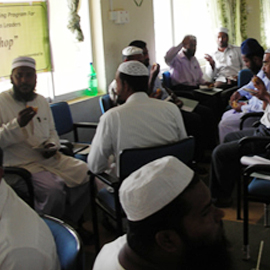
Islam and Co-existence Project2009-2011
Partners: Asia Foundation & Muslim Aid
May 2009 marked the turning point in the island’s protracted armed conflict, with the military defeat of the LTTE. However, three decades of a bitter civil war did much to heighten inter-communal mistrust and widen ethno-religious fault lines. Within these contested political spaces, Sri Lanka’s Muslim (or Moor) communities at times remained as unacknowledged victims of a civil conflict, viewed largely as a bi-polar ethnicized war between the Sri Lankan state and the LTTE. Muslims are a minority in most regions in country, with the exception of Ampara and Trincomalee. During the island’s postwar phase the neutrality of the Muslim community was often invoked as having a part to play in shaping inter-communal trust building and co-existence. There were also concerns about emerging trends and intra-group conflicts within Muslim communities themselves, particularly with respect to ideologies differences, and in some instances, the emergence of ‘extremist’ values. Sri Lanka has often enjoyed a high degree of interfaith as well as intra-religious plurality and hybridity.However at times, clashes between different theological schools of thought may occur, for example differences between Shaf’ee, Deobandi and Salafi perspectives within Islamic practices.
The project
The project was envisioned as a community leadership initiative, and aimed at enhancing the capacity of Muslim religious leaders of influence (Ulema) in the East to become role models and agents of change in identified conflict areas. The project targeted three categories of Ulema: those who teach in Madrasahs or religious schools those who are on the board of trustees at mosques, and leaders who preach at Friday sermons. Sri Lanka has approximately 3,000 mosques and 200 Arabic schools. The Moulavies and Moulavias who pass out from Arabic schools go on to become Imams, trustees and religious teachers who wield a great deal of influence within local communities. The programme aimed at partnering 1,436 individuals or approximately 20% of the Ulema community within the Trincomalee District. The participants hailed from over 250 mosques and 21 Arabic colleges. In addition, 200 existing Muslim leaders were engaged through two and three day experiential workshops. Together with the trainers, a series of modules were developed that covered topics such as Islam, peace and co-existence, community leadership, and also aimed at imparting practical skills such as presentation techniques and participatory community approaches. An imam who was among one of the religious leaders who participated, said the programme had lent him “the courage, and the ability….to discuss issues of governance, human rights and community problems in our sermons and teachings, not just worship and faith.”
Learning points
The training took on the format of a residential workshop. This helped as community leaders where taken out of their everyday routine and immediate social environment,so they could take a step back and reflect on the issues being discussed. At present, RECDO intends on expanding the initiative to include community leaders of other faiths (Buddhist, Christian and Hindu), and to deepen its additional inter-faith component.
The modules developed for the programme has been shared on the Publications page of this website.
